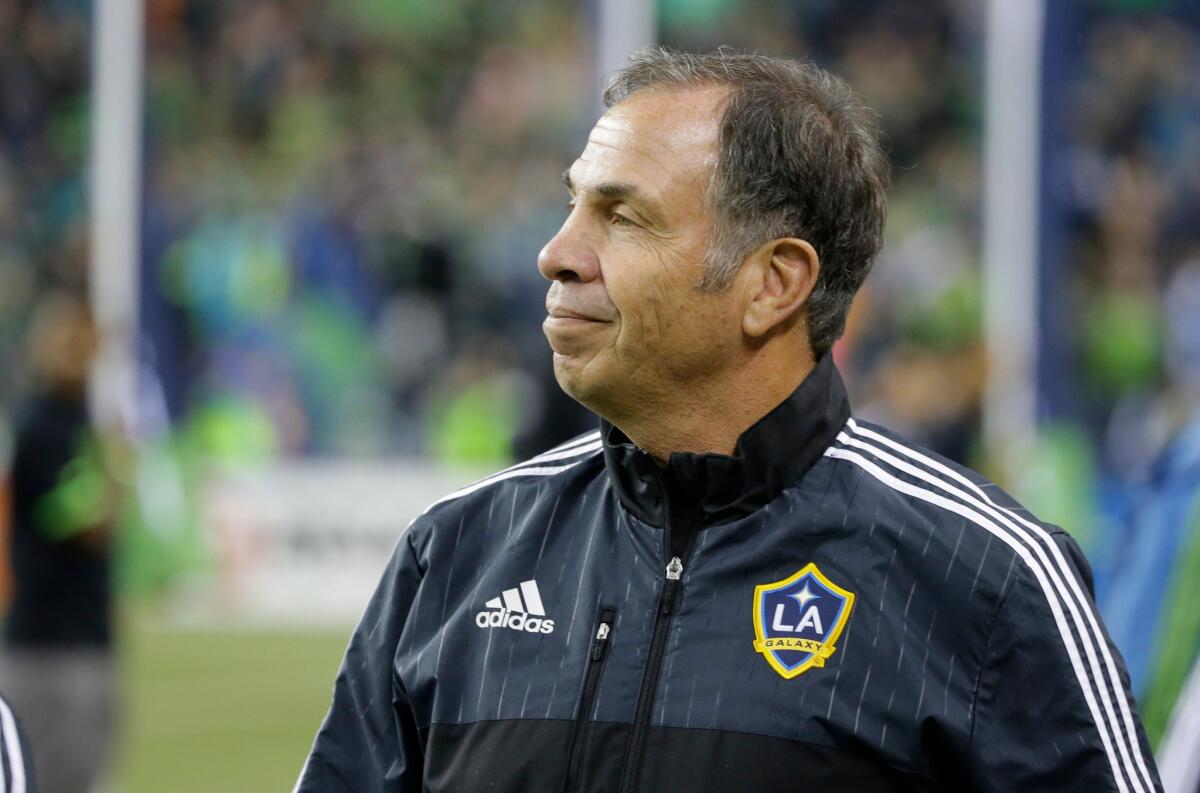After Galaxy’s playoff exit, 2016 decisions are at issue

- Share via
Confusion reigned at the StubHub Center on Friday.
Two days earlier the Galaxy had been bounced from the Major League Soccer playoffs in the first round, the quickest postseason exit in franchise history. And no one was quite sure how to react.
“We’ve never done this before,” shrugged David Kammarman, the team’s director of soccer operations.
So while Gyasi Zardes cleaned out his locker, filling a white plastic trash bag with cleats to hand out to kids in his hometown of Hawthorne, a number of teammates went through their regular workout routines, absent-mindedly preparing for a game that wouldn’t be played.
Upstairs in the team offices, Bruce Arena, the team’s coach and general manager, had already turned his attention toward planning for next season.
Zardes was in high school the last time Arena and the Galaxy were done before Halloween, with last week’s loss in the first round of the playoffs ending a string of six consecutive trips to at least the Western Conference semifinals.
In three of the last four seasons, the team has won the MLS Cup. Among Southern California’s professional teams, only the Lakers have ever won that many titles in that short a time.
But if the team’s early playoff exit was unexpected, it wasn’t necessarily unwelcome. Over the past seven years, the postseason obligations forced the Galaxy to play nearly nine extra months compared to some of its MLS rivals. And that’s taken a toll both physical and mental.
“The players, for the most part, have gone 10 1/2 months a year. And it’s never seemed like the time off has been enough,” Arena said. “This is not the worst time for a couple of guys to get rejuvenated.
“We’re in this to win, so we’re not thrilled about it. But maybe in the end it will be good.”
It will allow defenders Robbie Rogers (bone spurs) and A.J. DeLaGarza (hernia) to undergo surgical repairs, for example. And the extra time could also be helpful for Arena and President Chris Klein, who have a lot of questions to answer following a late-season collapse that saw their team win just one of its final eight games.
All 11 of the players who started in the Galaxy’s playoff loss are under club control for next season. Some — like designated players Robbie Keane, Giovani dos Santos and Steven Gerrard — are signed, and others, such as midfielders Sebastian Lletget and Juninho, have club options.
The team will decline its option with goalkeeper Donovan Ricketts, who allowed 10 goals in his final three games. But some of the other decisions Arena faces are more complicated — and money will be a big factor in most of them.
The team finished 2015 with a payroll of $19.5 million, the second-highest in league history. Still the Galaxy won’t know until next month if it can afford to keep defender Omar Gonzalez, who made $1.45 million last season.
When the team took one of its three designated player slots from Gonzalez to sign Dos Santos in July, it had to spend five years’ worth of league allocation money to pay down Gonzalez’s contract and squeeze it under the league’s $3.49-million payroll cap. Though that money is no longer available, more salary relief could be coming from the MLS Board of Governors, which is expected to consider awarding teams hundreds of thousands of dollars in additional allocation money when it meets Dec. 6.
Keeping Gonzalez would solve only one problem, though. Arena will still have to find money for Juninho, who is due a raise from the $350,000 he made last season, and Zardes, who was guaranteed $223,000 in 2015.
Ricardo Silveira, Juninho’s Brazil-based agent, said clubs in Europe and the Middle East have expressed interest in the 26-year-old midfielder, who is sixth on the Galaxy’s all-time list for appearances by a field player.
“It’s not only the money situation,” Silveira said of Juninho, who has constantly found himself in the shadow of a midfield teammate, first with David Beckham and now with Gerrard.
“He likes to play for Bruce,” the agent continued. “[But] Juninho wants to be recognized, that’s for sure.”
Lletget, who was second on the team in scoring after joining the Galaxy from England’s West Ham United in May, is also believed to be listening to offers from Europe.
Both Juninho and Lletget would probably need the Galaxy to refuse their MLS contract options before they could sign elsewhere. But the team could find itself needing to make such a deal to keep the rest of its roster within the league’s salary structure.
Then there’s the goalkeeper situation, a recurrent problem for a team that has used a different starter in each of its last four season openers. Among the possible solutions are Jaime Penedo, who helped the Galaxy to a league title in 2014, and former Chivas USA keeper Dan Kennedy, long a favorite of Arena, a national team goalie in his playing days.
Penedo was released by the Galaxy in July after demanding a contract extension, a decision he now regrets. Both Eddie Rock, Penedo’s agent, and Arena both said last week they would be open to renewing their relationship.
MLS rules against tampering prevent the Galaxy from discussing Kennedy, who has lost his starting spot with FC Dallas. Ron Waxman, the player’s agent, also downplayed talk of a trade, saying, “There is no basis in fact now.”
He didn’t say anything about later, though. And this season Arena finally has time on his side.
Follow Kevin Baxter on Twitter @kbaxter11







